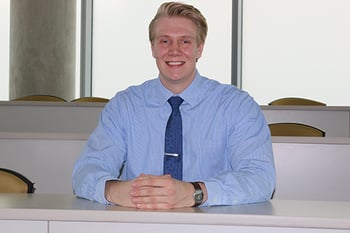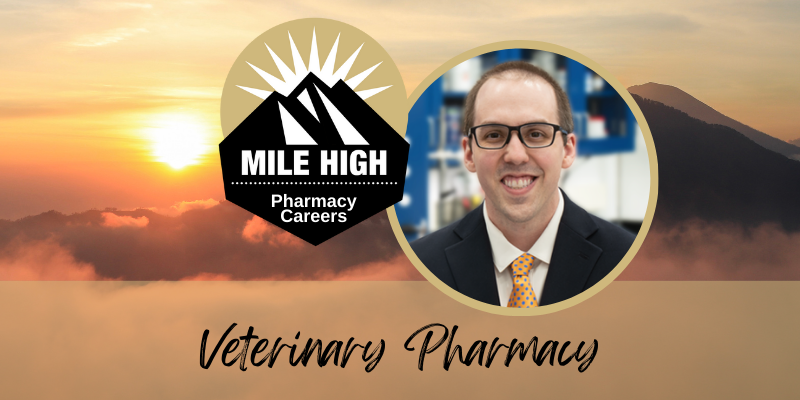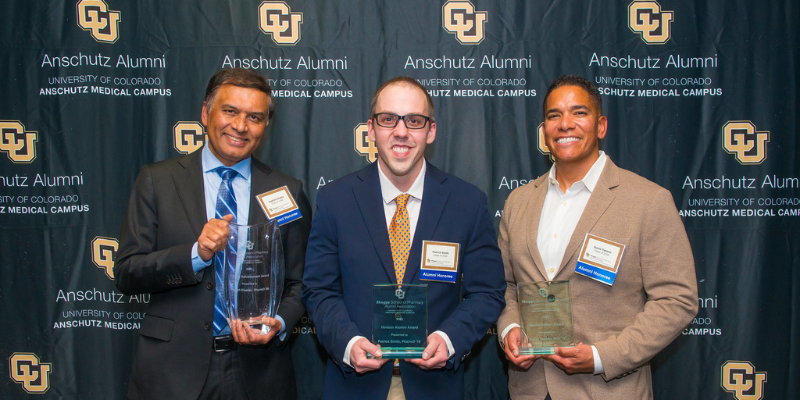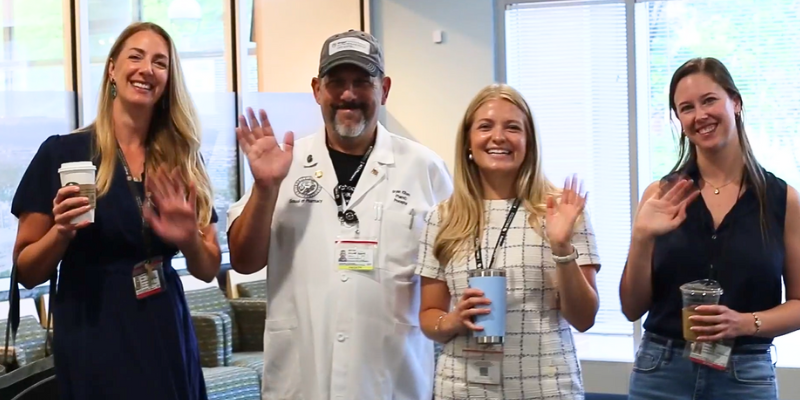Since he was a teen, computers and pharmacy have fascinated Dean Marucci, PharmD, a 2018 graduate of the Skaggs School of Pharmacy and Pharmaceutical Sciences. Thanks to a pivotal P4 rotation, he has found a job that blends both interests perfectly.
For the past year, Dr. Marucci has worked in Colorado for Tabula Rasa HealthCare, headquartered in Moorestown, New Jersey. The 10-year-old company provides patient-specific, data-driven technology and solutions that enable healthcare organizations to optimize medication regimens to improve patient outcomes, reduce hospitalizations, lower healthcare costs and manage risk. Medication risk management is Tabula Rasa’s leading offering.
As a P4, Dr. Marucci completed a six-week-long rotation at Tabula Rasa’s headquarters, working with its informatics and pharmacogenomics teams.
“I loved every moment of it,” he recalls.

Dr. Marucci’s type of work, while not the norm for CU Pharmacy graduates, is becoming more common as technology plays a bigger role in the field of pharmacy, according to Katy Trinkley, PharmD, associate
professor of clinical pharmacy.
“We are going to see increasingly more people go down similar paths as Dean did,” she predicts.
Megan Thompson, PharmD, director of experiential programs, agrees.
“I am finding that more and more students are interested in combining their pharmacy knowledge and tech skills, and finding jobs that will support it,” she says. “Our pharmacy students are thinking very creatively about improving patient safety, drug monitoring, and medication management. Tabula Rasa and other companies like it are really providing a platform for pharmacy students to share these innovative ideas.”
Dr. Marucci’s route to a PharmD began when he was 13 or 14 years old and a family friend explained his work as the pharmacy director at Swedish Medical Center in Englewood. “I thought (the job) was cool,” Dr. Marucci recalls.
Computers fascinated him, too. In high school, Dr. Marucci was on the web development team and learned to code. In college, he started fixing computers for friends and building his own.
CU Pharmacy does not require a bachelor’s degree for admission. Dr. Marucci completed his pharmacy prerequisites at the University of Colorado and then received a bachelor’s degree in medical science during his first year at CU Pharmacy.
He explored different types of pharmacy during his first two years of school, but didn’t find the right fit. Then, in his third year, came pharmacogenomics with Christina Aquilante, PharmD, professor of pharmaceutical sciences, and pharmacy informatics with Dr. Trinkley.
“That was a game-changer,” he remembers. But he still wasn’t sure what came next.
A classmate suggested he speak with Dr. Thompson about P4 rotations that mixed technology and pharmacy. Dr. Marucci was the first student to ask about such an opportunity, she recalls, and she had no immediate matches. At a national pharmacy meeting a few weeks later, Dr. Thompson met people from Tabula Rasa, who enthusiastically agreed to her request to host a rotation for a student with IT experience.
“Dean was the first student I had met with who said he was interested in this field, and this was the first company that said yes to taking students,” Dr. Thompson says. “Dean had the right attitude, right personality and the technical skills to do something like this. In short, I knew he would be a good representative of the school.” Tabula Rasa remains
among CU Pharmacy’s 1,000 rotation sites worldwide and Dr. Thompson hopes to match students to the company in the future.
The rotation went well and the company offered Dr. Marucci a job just before graduation.
Dr. Marucci works from Colorado for Tabula Rasa. He is an informatics support specialist and works in business development for one of the company’s products called NiaRx.
NiaRx is a cloud-based software program that provides electronic health records (EHR) training and patient-case simulation for pharmacy students. It uses the company’s
MedWise software platform to identify accumulative multi-drug interactions to help manage patients’ medication regimens.
“I’ve been able to use my PharmD degree to create clinical content for NiaRx,” Dr. Marucci explains. He also sells the product to pharmacy schools around the country.
“My degree allows me to understand pharmacy schools’ needs,” he continues. “I’m also able to understand the needs of pharmacists and pharmacy students and (have the technology skills) to express their wants and needs to our development team. I can speak both languages.”
The education he received at CU Pharmacy, especially in pharmacogenomics, set him apart from other schools’ pharmacy graduates, Dr. Marucci believes.
“I couldn’t have done it without CU Pharmacy. I am building on the foundation they gave me,” he says.
The school, especially Dean Ralph Altiere, PhD, recognizes that technology is playing a bigger role in healthcare and students must be trained accordingly.
“When our graduates enter the workforce, they need different skills compared to past graduates,” Dr. Trinkley says. They must understand the capabilities of technology and how they work with them, whether it is a pill-dispensing kiosk, an EHR, or Watson Health, IBM’s powerful artificial intelligence tool for solving health challenges.
Equally important, Dr. Trinkley says, graduates must know how to think creatively, show empathy and communicate skillfully – things that machines cannot do.
“Dr. Altiere sees that and is making sure our students are prepared for that,” Dr. Trinkley says.



